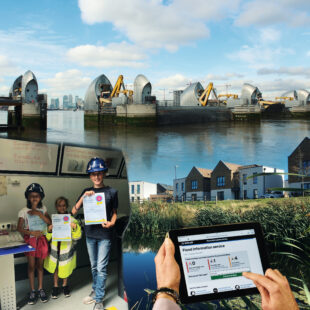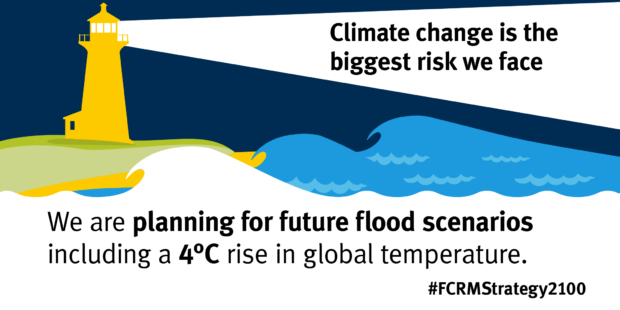
Climate change is the biggest challenge we face as a nation. We can already see the impact of a changing climate with increased flooding over the past decade and summer heatwaves. In all climate futures, we’ll experience a continued rise in sea level well into the next century.
The draft Flood and Coastal Erosion Risk Management Strategy is now out for consultation and we’re encouraging everyone to get involved in conversations about how we better plan for and adapt to future flood and coastal risks.
It’s only two weeks to go until the start of the Flood and Coast Conference in Telford, the event a fantastic opportunity to get people together to talk about our vision for a nation ready for, and resilient to, flooding and coastal change – today, tomorrow and to the year 2100.

We can’t deliver the strategy on our own, and we shouldn’t be looking to. The success of this Strategy will be working with risk management authorities and other partners to mobilise a nation of climate champions who understand their risk, are responsible for it and how know to act on it.
The strategy seeks to achieve that resilience through three strategic ambitions: first, building climate resilient places; second, ensuring that today’s growth and infrastructure are resilient to tomorrow’s climate; and third, creating a nation of climate champions. So we have framed this year’s Flood and Coast conference around the three ambitions of the draft FCERM strategy. Over the course of 18 – 20 June, you can hear speakers, attend workshops, and join the debate about all things flood and erosion risk, resilience and response.
What’s the Strategy all about?
Looking to the year 2100, the draft strategy aims to blend long term ambitions with shorter term practical steps to creating climate resilient places. The draft strategy focuses on the objectives we should take forward as a nation over the next 10 to 30 years whilst also setting out a more short term, no regrets measures we want to progress sooner.
In more detail, the three main ambitions of the draft strategy are:
- Climate resilient places
Working with government and partners to explore and develop the concept of standards for flood and coastal resilience as well as a national suite of tools that can be used to deliver flood and coastal resilience in places.
- Today’s growth and infrastructure resilient in tomorrow’s climate
Getting the right kind of development in the right places to deliver sustainable growth and working with government and other agencies to enable infrastructure resilient to flooding and coastal change.
- A nation of climate champions
Better preparing society through education and accessible digital information as well as being a world leader in flood and coastal resilience.
We want you to be part of it
The consultation for the draft FCERM strategy was launched on 9 May 2019 and is open until 4 July 2019. We are encouraging as many people as possible to have their say.
You can view the consultation and the draft strategy document here: https://consult.environment-agency.gov.uk/fcrm/national-strategy-public/
We would love for you to discuss it with your friends, colleagues and networks. This is your opportunity to have your say on the future of flooding and coastal change; tell us what you like, what different things you’d like to see, and what you’d like to add.
We will be reviewing each of the responses we receive, and they will inform the final strategy which will be published in 2020.
I look forward to hearing your thoughts on the future of flooding and coastal change.


Leave a comment